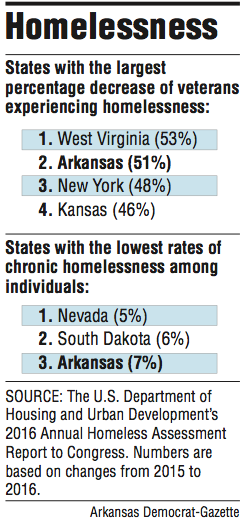Arkansas' homeless population has decreased by 3.8 percent from last year and 10.8 percent from 2010, according to a nationwide survey by the U.S. Department of Housing and Urban Development, which reports the figures to Congress each year.
From 2015 to 2016, the number of homeless veterans in Arkansas dropped by 51 percent -- the second-largest percentage decline in the country, according to the survey.
"We've made tremendous strides in reducing the homeless veteran population," said Dr. Irving Kuo, acting deputy chief of staff for the Central Arkansas Veterans Healthcare System. "We've been able to not only assist single veterans, but couples and families as well."
Homelessness continues to decline in the U.S., specifically among families with children, veterans and individuals with long-term disabling conditions, according to the HUD survey.
The annual report found that 549,928 people nationwide experienced homelessness on a single night in 2016, a decline of 14 percent from 2010, the year President Barack Obama's administration started Opening Doors, the nation's first comprehensive strategy to prevent and end homelessness.
The report is based on data from about 3,000 cities and counties across the nation. The numbers are based on a snapshot of a single night in January 2016, compared with a single night in January 2015. The survey included homeless people in shelters as well as those living in vehicles, parks and on the street.
Over a seven-year period that began in 2010, HUD estimates the nation experienced a 23 percent reduction among homeless families, a 47 percent drop in homeless veterans and a 27 percent decline in individuals experiencing chronic homelessness, according to a news release from the agency.
This year, Arkansas had an estimated 2,463 homeless people, including 222 veterans and 201 "unaccompanied youth."
The number of homeless Arkansans in families with children dropped by 14 percent from 727 last year to 625 this year.
Sixty-six percent of Arkansas' homeless population this year was sheltered, according to the study.
The number of veterans experiencing homelessness decreased in 42 states plus the District of Columbia between 2015 and 2016. The largest absolute decreases were in California (1,699 fewer veterans), New York (1,151), Florida (1,024) and Texas (625). The largest percentage decreases were in West Virginia (53 percent), Arkansas (51 percent), New York (48 percent) and Kansas (46 percent).
The number of homeless veterans in Arkansas dropped from 456 in 2015 to 222 this past January, according to the survey.
Kuo said the numbers reflect the good work that has been done.
"We think the HUD study shows that efforts to care for the nation's veteran population is having positive results," said Kuo. "I personally think it's wonderful and in line with what we see locally in the reduction of the number of homeless veterans in our communities. ... But, we're also focusing on that portion of the veteran population that may be in jeopardy of losing their homes and actively working to find solutions to keep them in their homes."
Kuo said the Veterans Day Treatment Center in downtown Little Rock has helped make a positive difference. It provides clinical services, including psychiatric treatment, vocational services, addiction treatment, psychosocial services and housing assistance if needed to any eligible veteran.
At 7 percent, Arkansas had the third-lowest rate of chronic homelessness among individuals (not in families). Nevada was the lowest with 5 percent, followed by South Dakota with 6 percent.
According to a data link included with the news release, Arkansas' population of homeless individuals remained about the same as it did in 2015, with only five more being reported this year.
Kevin Fitzpatrick, a professor of sociology at the University of Arkansas in Fayetteville, said surveys like this one from HUD usually underreport. For one thing, he said, they don't count people who are "doubling up" with friends and family.
"The invisible homeless are just as important to the homeless narrative than those that are visible," Fitzpatrick said in an email.
Recent efforts have focused on helping homeless families, which would account for the decline in that category, he wrote.
A Section on 11/18/2016

